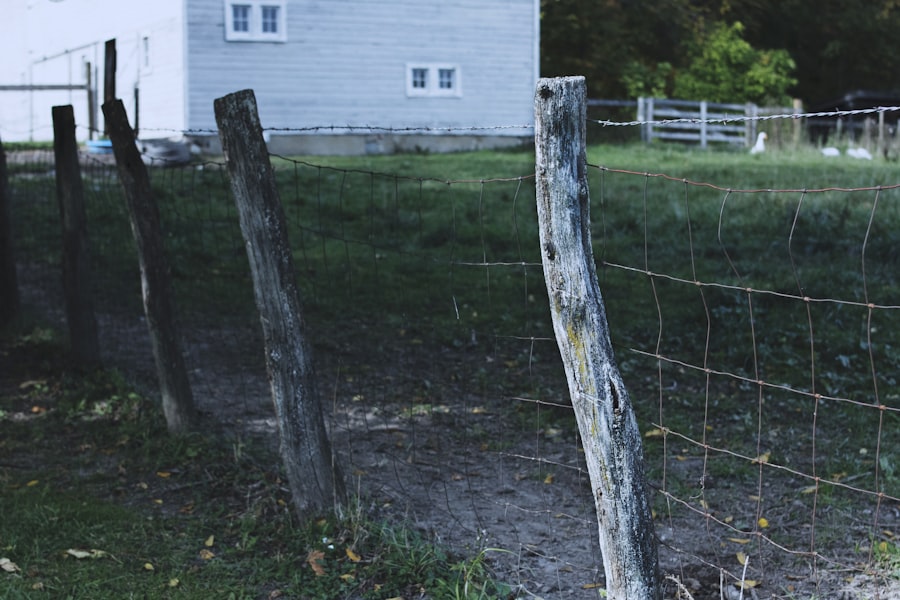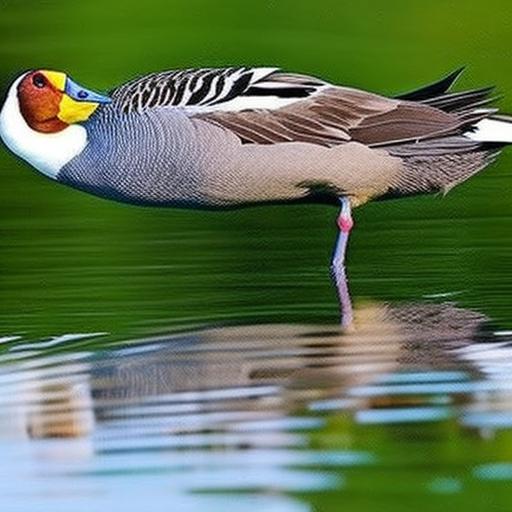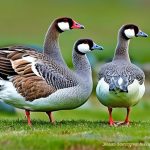Geese can be a beautiful sight to behold, but when they start invading your yard, they can quickly become a nuisance. From leaving droppings all over your property to damaging your landscaping, geese can cause a variety of problems. Understanding their behavior is crucial in finding effective ways to deter them from your yard. By implementing the right strategies, you can create a goose-free environment and maintain the beauty of your property.
Key Takeaways
- Geese are social animals and tend to gather in large flocks.
- Attractants in your yard, such as standing water or food sources, can draw geese in.
- Physical barriers, such as fences or netting, can prevent geese from accessing your yard.
- Sound and light devices, such as alarms or strobe lights, can scare off geese.
- Landscaping strategies, such as planting tall grasses or using hedges, can make your yard less appealing to geese.
Understanding the behavior of geese
To effectively deter geese from your yard, it is important to understand their behavior. Geese are migratory birds, meaning they travel long distances during certain times of the year. They typically migrate in large flocks and follow specific routes. By understanding their migratory patterns, you can anticipate when geese are likely to be in your area and take appropriate measures to deter them.
Geese are also known for their nesting habits. They prefer to nest near bodies of water, such as ponds or lakes, where they can find food and protection. During nesting season, geese become territorial and may become aggressive if they feel threatened. Understanding their nesting habits can help you identify potential attractants in your yard and take steps to discourage them from nesting.
Feeding habits also play a role in geese behavior. Geese are herbivores and primarily feed on grasses, grains, and aquatic vegetation. They are attracted to areas with abundant food sources, such as well-maintained lawns or agricultural fields. By identifying potential food sources in your yard, you can take steps to make them less appealing to geese.
Identifying potential attractants in your yard
To effectively deter geese from your yard, it is important to identify potential attractants that may be drawing them in. Geese are attracted to areas with abundant food sources, water sources, and shelter.
Food sources can include well-maintained lawns, agricultural fields, or bird feeders. Geese are particularly attracted to areas with short, tender grass. By keeping your lawn longer and allowing it to grow slightly taller, you can make it less appealing to geese.
Water sources are also a major attractant for geese. They prefer to nest near bodies of water and will often congregate in areas with ponds or lakes. If you have a pond or water feature in your yard, consider installing a fountain or other water movement device to make it less appealing to geese.
Shelter is another factor that can attract geese to your yard. Geese prefer areas with tall grasses or shrubs where they can hide and feel protected. By removing or trimming tall vegetation in your yard, you can make it less attractive to geese.
Installing physical barriers to deter geese
One effective way to deter geese from your yard is by installing physical barriers. Fencing can be an effective deterrent, especially if it is tall enough to prevent geese from flying over it. Netting can also be used to cover areas where geese may be nesting or feeding, making it difficult for them to access those areas.
Spikes can also be installed on ledges or other surfaces where geese may attempt to land. These spikes make it uncomfortable for geese to perch or walk on, discouraging them from staying in your yard.
Using sound and light to scare off geese
Another strategy for deterring geese is by using sound and light to scare them away. Noise makers, such as air horns or whistles, can be effective in startling geese and causing them to fly away. Motion-activated lights can also be used to startle geese and make them feel uncomfortable in your yard.
Reflective tape can also be effective in deterring geese. By hanging strips of reflective tape in areas where geese may congregate, the light reflecting off the tape can create a visual deterrent and make them feel uneasy.
Implementing landscaping strategies to discourage geese

Landscaping strategies can also be effective in deterring geese from your yard. Planting unappealing vegetation, such as tall grasses or shrubs with thorns, can make your yard less attractive to geese. Removing attractive plants, such as ornamental grasses or berry-producing shrubs, can also help deter geese.
Creating barriers with rocks or mulch can also discourage geese from entering certain areas of your yard. By placing rocks or mulch around the perimeter of your lawn or near water sources, you can create physical barriers that make it difficult for geese to access those areas.
Using decoys to trick geese into avoiding your yard
Decoys can be an effective way to trick geese into avoiding your yard. Fake predators, such as plastic owls or coyotes, can be placed in your yard to scare away geese. Fake geese can also be used to create the illusion of a large flock, which may deter geese from landing in your yard.
It is important to regularly move decoys around to prevent geese from becoming accustomed to them. Geese are intelligent birds and may quickly realize that the decoys are not a threat if they remain in the same location for an extended period of time.
Applying repellents to keep geese away
Repellents can be another effective way to keep geese away from your yard. Chemical repellents, such as methyl anthranilate, can be sprayed on grass or other vegetation to make it taste unpleasant to geese. Natural repellents, such as garlic or hot pepper spray, can also be effective in deterring geese.
Homemade repellents can also be made using ingredients such as vinegar or ammonia. These repellents can be sprayed on grass or other areas where geese may be feeding or nesting.
Educating your neighbors on responsible feeding habits
One often overlooked aspect of deterring geese is educating your neighbors on responsible feeding habits. Feeding geese can create a dependency on human-provided food and can lead to an increase in the goose population. By educating your neighbors on the dangers of feeding geese and providing alternatives, such as bird feeders or bird baths, you can help reduce the attractiveness of your neighborhood to geese.
Encouraging responsible behavior, such as not feeding geese and properly disposing of food waste, can go a long way in deterring geese from your yard and maintaining a goose-free environment.
Seeking professional help for persistent geese problems
If you have tried various strategies and are still experiencing persistent geese problems, it may be time to seek professional help. A professional wildlife control company can assess your situation and provide long-term solutions to deter geese from your yard.
When choosing a professional company, it is important to find a reputable one that has experience in dealing with geese. They should be knowledgeable about the behavior of geese and have a proven track record of successfully deterring them from properties.
Long-term solutions may include habitat modification, such as altering the landscape to make it less attractive to geese, or implementing deterrent techniques that are specific to your property.
Maintaining a clean and tidy yard to discourage geese from nesting
One of the most effective ways to discourage geese from nesting in your yard is by maintaining a clean and tidy environment. Regularly cleaning up debris, such as fallen leaves or branches, can make your yard less appealing to geese. Removing standing water, such as puddles or birdbaths, can also discourage geese from nesting in your yard.
Keeping grass trimmed can also make your yard less attractive to geese. Geese prefer areas with short, tender grass, so by keeping your lawn well-maintained and slightly longer, you can make it less appealing to geese.
In conclusion, geese can be a nuisance when they invade your yard, but by understanding their behavior and implementing the right strategies, you can effectively deter them. By identifying potential attractants in your yard, installing physical barriers, using sound and light to scare off geese, implementing landscaping strategies, using decoys and repellents, educating your neighbors on responsible feeding habits, seeking professional help if needed, and maintaining a clean and tidy yard, you can create a goose-free environment and maintain the beauty of your property. Taking action to prevent geese problems is important not only for your own enjoyment of your yard but also for the health and safety of the geese themselves. By sharing these tips with others, you can help create a community that is free from geese problems.
If you’re looking for effective ways to keep geese out of your yard, you might also be interested in learning about turning a shed into a chicken coop. This article from Poultry Wizard provides valuable insights on how to repurpose a shed into a safe and secure space for your chickens. By implementing the tips and techniques mentioned in this article, you can create a designated area for your feathered friends, ensuring they stay protected while keeping unwanted geese at bay. Check out the article here to discover more about this innovative solution.
FAQs
What are some common problems caused by geese in yards?
Geese can cause damage to lawns, gardens, and landscaping. They can also leave behind large amounts of droppings, which can be unsightly and unsanitary.
What are some effective ways to keep geese out of my yard?
Some effective ways to keep geese out of your yard include installing physical barriers such as fences or netting, using scare tactics such as decoys or noise makers, and removing food sources that may attract geese.
Are there any humane methods for keeping geese out of my yard?
Yes, there are several humane methods for keeping geese out of your yard. These include using visual deterrents such as reflective tape or balloons, planting vegetation that geese do not like, and using water sprayers or sprinklers to discourage geese from entering your yard.
Is it legal to harm or kill geese that enter my yard?
No, it is not legal to harm or kill geese that enter your yard. Geese are protected under federal law, and harming or killing them can result in fines and other legal consequences.
What should I do if I encounter an injured or sick goose in my yard?
If you encounter an injured or sick goose in your yard, it is best to contact a local wildlife rehabilitation center or animal control agency for assistance. Attempting to handle or care for the goose yourself can be dangerous and may further harm the animal.
Meet Walter, the feathered-friend fanatic of Florida! Nestled in the sunshine state, Walter struts through life with his feathered companions, clucking his way to happiness. With a coop that’s fancier than a five-star hotel, he’s the Don Juan of the chicken world. When he’s not teaching his hens to do the cha-cha, you’ll find him in a heated debate with his prized rooster, Sir Clucks-a-Lot. Walter’s poultry passion is no yolk; he’s the sunny-side-up guy you never knew you needed in your flock of friends!







